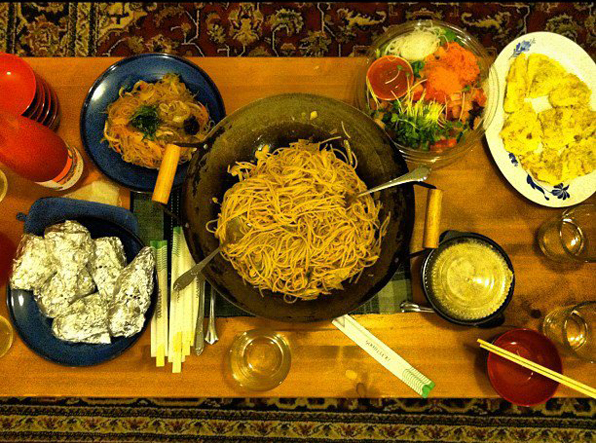
A Guest Post by Neil Aitken

Editors’ Note: We welcome Boxcar Poetry Review editor and Issue 4 contributor Neil Aitken to the blog this summer as he guest-curates a short series for us about his poetry potlucks, a unique tradition combining food and literary community that he began several months ago in his L.A. apartment. Over the course of the next few weeks, Neil will be sharing about his experiences hosting and developing the concept of the poetry potluck, and may even invite a few of his past guests to share theirexperiences, as well.
In this week’s post, Neil discusses some of the background behind his poetry potlucks and provides some practical pointers about what it takes to host such a gathering. We hope that this post, as well as the rest of the series, will inspire you to carve out time to break bread with other members of the literary community where you live–and to maybe even begin a poetry potluck tradition of your own.
* * *
Whether you live in the big city or in a small town, writing tends to be a lonely labor and we often find ourselves craving opportunities to discuss our work and our interests with others who share a passion for literature and the arts. Writing retreats like Kundiman and VONA are certainly helpful in providing us with safe spaces for sharing our work and inspiring us to innovate—they also provide us with the chance to meet fellow writers and artists who are exploring and challenging the contemporary literary landscape. Once the retreat is over though, often, unless we live someplace with a significant population of our fellow participants, we’ll return home to our original communities and find ourselves back where we started (at least in terms of face-to-face contact). While we may stay in touch with our new friends and peers through email and Facebook, these forms of contact still pale in comparison to time spent together.
One possible solution is to create our own spaces of sharing and interaction. For the past several months, I’ve been doing this by hosting poetry potlucks in my little apartment in Los Angeles.
Potlucks are a powerful way of building community—they encourage sharing and interaction. For my poetry potlucks, I ask each participant to bring a dish and a poem to share. People often bring food that they’ve prepared at home, but it’s also perfectly fine to bring something store-bought. My neighborhood is full of great restaurants, bakeries, and grocery stores, so even a late arrival can pick something up on the way in.
Likewise, there are no fixed rules about what type of poetry needs to be shared. I let my guests know that the potluck isn’t a formal workshop—they are welcome to bring something finished that they want to share as a way of introducing others to their current projects, or they can bring copies of something they want feedback on. The emphasis should always be on dialogue and exchange—a poetry potluck promotes active and engaging discussion, book and movie recommendations, brainstorming, and hopefully a fair bit of cross-pollination and creative inspiration.
These poetry potlucks have been a big hit here in Los Angeles—largely because they fill a vital role, providing a space where community is born and fostered. Here are some suggestions and tips I’ve learned over the past year’s worth of poetry potlucks. Hopefully these ideas will be helpful to you if you’re interested in creating a poetry potluck or something similar in your own community.
How to Get Started
First, you need guests. I started by creating a private group on Facebook and inviting poets on my friends list that I knew lived in the greater Los Angeles area. I also continued to attend local poetry readings and would to introduce myself to poets whose work I enjoyed. If they seemed like they’d be a good fit for the group, I’d mention the potluck idea, get their contact information, and invite them to come to the next potluck. You can also find new potential recruits through your guests—after they’ve attended a poetry potluck, ask them if they know of any other local poets who would be good additions to the group. When I first started, I had about 20 people on my list—we now have close to 70. When I know the date of the next potluck, I send out a Facebook event invite to all the members of the group. Don’t worry about how many people end up on your list—the reality is that not every person can attend every potluck. And in fact, you only want a small number to actually attend each time. In my invitation, I tell people that I only have room for 4-6 guests, and so they need to RSVP to guarantee a spot. As people RSVP, I update the event page to indicate who the current guests are and how many slots remain.
Second, you need a place. I use my apartment which has a living room area I’ve set up as a library space—books on most walls, some simple art, and two coaches and a couple wooden chairs. It’s small, but cozy—the way that the furniture is arranged is set up to facilitate conversation (an L-configuration, coffee table which doubles as the serving surface, and additional wooden chairs facing across). However you arrange your potluck space, try to ensure that each participant can see and engage the others easily in conversation and that the food is convenient to all.
Third, you need a time. Thursday evenings have worked especially well for us—I’m not certain if this is unique to Los Angeles, but Thursday night usually isn’t too busy with other poetry and arts events. It helps to establish a regular pattern—whether it’s the same day of the week or the same point in the month. Choosing the time and day may require consideration of other local factors. In my neighborhood, parking is always a challenge, especially on weekends. Thursdays work for that reason as well. I do encourage car-pooling and on occasion, others have taken the metro line in. If people do drive, I let them know that they might need to spend a few extra minutes searching for a spot. As a host, it pays to learn where the free parking spaces tend to be in your area—and when meters turn off. I include all this information in my invites so that guests can decide which approach is the best for them. In my case, it was important to choose a start time that would enable free parking to be available and ensure people from the west side of the city had time to drive over.
Fourth, you need a menu. It’s a good idea to decide early what types of dishes each confirmed participant is bringing. While not everyone will know in advance (there’s always someone who because of time or work ends up just picking up something on the way over), it’s very helpful to have some sort of plan. For example, it’s really important to know if you have vegan or vegetarian participants attending so that you as a host can guarantee that there are some vegan-friendly dishes available. If someone has allergies, those should be communicated up front. If someone has dietary restrictions for other reasons (religion, health, beliefs), make certain those restrictions are posted so that other participants can adjust if necessary. Some of potlucks have ended up with all-vegan fare. Other times we’ve had themed potlucks. You can have a lot of fun with what the food offerings are. As a host, I try to prepare at least one dish and have the ingredients for a second dish on hand if we need to put something else together quickly. Just having fresh rice in a rice cooker can be a good enough backup plan. There will occasionally be people whose dietary restrictions will be too difficult to accommodate—usually they are already aware of this and will bring something for themselves, knowing there might not be anything else that will work for them. Still, so long as everyone brings something to share, it’s all fine.
How it runs
7:30pm – Our scheduled time. Usually a couple guests arrive on time and I’ll collect their dishes and set them out. If I’m still finishing cooking, sometimes I’ll recruit one of them to help out. As people come, we chit-chat about various things: what we’re reading, traffic (very LA), and who else is coming. I have a lot of books on my shelves, so people often end up browsing and asking me about different things they come across.
8:00pm – Most people have arrived by now and we’ll start eating. Again, it’s all quite relaxed and conversation tends to happen naturally as people introduce themselves, discuss what they’re working on, where and what they studied, and what they’ve been reading lately. Often people find unexpected connections and common interests—it’s always amazing to me how small the world is when we actually sit down and talk to each other for more than five minutes.
9:00pm – Well, somewhere after 9pm as we’ve filled our stomachs and enjoyed good conversations, we’ll transition to sharing poems. Some guests who are seeking feedback will pass out copies and read their poem to us and we’ll make some comments and suggestions. I usually ask them what types of things we should be paying attention to and what kind of feedback they would like. Others just want the opportunity to share their work with a new audience and want a much more informal response. Both approaches can work for this environment—I do think though that it helps that we’ve spent an evening getting to know each other first, so that when we encounter the poem, we have a sense of the larger context and concerns from which it arises.
10:00pm – Usually at this point we’re winding down. We’ll have dessert if anyone brought it, review whatever book recommendations and poetry suggestions we’ve discussed over the evening, and say our goodbyes. If people have parked farther away, I’ll walk them or drive them back to their cars.
It’s nice if someone takes a few photos of the event. It’s also good to remind people to exchange emails if they want to continue their discussions. Often the discussions of the evening begin longer dialogues and exchanges.
And there you have it—a crash course in holding your own poetry potluck. I’ve had a lot of fun hosting these events and find it really invigorating and encouraging to hear the work of writers from the community and see what they are doing and working on. There are always surprises—and always something new to learn.
* * *